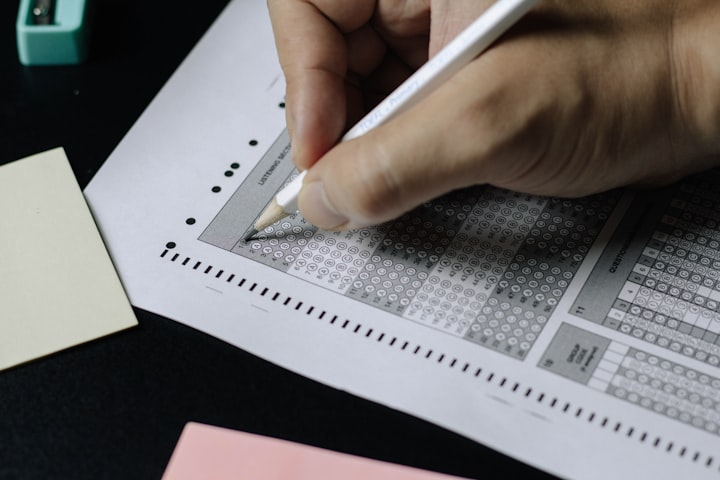When You Have Multiple Choice Exams
Strategies To Ensure You Choose The Correct Answer

Multiple-choice tests are widely spread in university entrance exams, graduate admission exams, as well as multi-level language tests, and they are distinguished by the fact that they depend on the student’s understanding of the subject he is studying without the need to write long paragraphs and memorise lengthy topics, which are quickly forgotten after memorisation and difficult to repeat. Completely written without errors.
However, the student often gets confused and confused in the multiple-choice tests and does not know how to choose a correct answer among several similar and often close answers. Below we will show 10 strategies that can be used while answering multiple-choice questions to ensure that your answers are correct at a high rate to ensure that you pass the exam.
The Strategies for Multiple Choice Answers:
- Don't rush, let the question tell you what it wants
Read the question first. Most students don't finish reading the question until they jump to the answer, perhaps because a similar question went through their review yesterday, or because the teacher focused too much on that question, or simply because they're afraid of running out of time. Whatever the reason, the result is that you will likely lose the mark for this question from your haste. Read the question carefully, it won't take more than an extra seconds but it's a detailed one.
- Ignore the answers
Find the answer yourself or try to remember it, and if it needs a solution, solve it and reach the final answer before looking at the answers given, then compare your findings with the answers given. Looking at the answers will play with your mind and create the illusion that the answer matches what you remember. On the contrary, matching your answer to the options later will make you feel at ease.
- Eliminate as many wrong choices
I read the question and could not in any way come up with an answer, do not be afraid and do not be nervous. If you don't know the correct answer, surely you can distinguish some wrong answers from among the options presented, look for the irrational answers and exclude them, then compare opposites such as (always), (never) and (only), or opposites such as (-1) and (1 ) or conjunctions and conditionals, all of these are indicators that may help you know the answer. Cross out any answer that does not match the question form. If the question is posed in the singular, the answer cannot be in the plural form, or if the question is in the present form, then the answer is not in the past form. If the two answers are opposite, it is likely that one of them is correct.
- Don't look back
Skip the answers you considered wrong and don't even look at them again, because this will make you doubt your answer, and cause you a problem that may lead to changing the correct answer to the wrong one. How many times did you choose the correct answer to change it later and curse your stupidity when you know the answer after the exam?! Stop hesitating and be reasonable.
- Select the best answer, choose it and blink
After you have eliminated the wrong answers, re-read the question carefully with the remaining options. Which one seems more reasonable?! Select it. In many cases, you may not know your preference for one of the two logical options and that is okay, but don't waste a lot of time going around in the same circle if you don't find a reason to prefer one of the two options the first time, I don't think anything will change the 50th time. Mark the question to come back to it if you have time, but don't leave it before you make a choice.
- Leave the correct one if you find the correct one
Before answering, read all the available options and do not skip any of them because in this speed you may miss an answer that may be the desired one. Often the text of the question at the beginning asks us to choose the correct answer, but our haste did not allow us to read its text. So go through all the answers and pick and choose.
- A bird in the hand and no ten on the tree
When you find a question you don't know, don't sit with it crying and waiting for inspiration to undo its knot, so you lose someone else. Start with the questions you know or those that are related to the research you have mastered, then the more difficult and the more difficult. The confidence you will gain from your sense of accomplishment will help you solve difficult questions. On the contrary, worrying about not being able to solve some questions can cost you a lot.
- In memorisation tests, look for long sentences
Do not neglect long statements because they are often the right choice. It is difficult to form wrong long statements. Professors often do not tend to put long wrong answers that can differ between them. Follow this method after following the first steps.
- “All of the above” and “None of the above”
When answer choices include “all of the above” and “none of the above,” do not select “all of the above” if you are absolutely certain that at least one of the answers given is incorrect. The same applies to “none of the above” if you are confident that at least one of the answer choices is correct.
- Use drafts or side papers if allowed
This helps you - especially in exams for scientific subjects - to write diagrams or perform side arithmetic operations as you usually remember, thus facilitating the process of retrieval of information. choices as you think about the question.
- Finally, and here's An Extra tip for you: Trust yourself
In one of my high school exams, I remember being confused between two answers to one of the questions and then I thought and chose one to hear the students whispering among themselves that the second possibility was correct. On that day, I was afraid to change my answer and discover that their answer was wrong, so that I would be wrong twice, once because the answer was wrong and once because I did not trust myself and my mental judgement. I stuck to my answer only to find out later that it was wrong, but I never regretted it. Therefore, I advise you not to make the last-minute action movie moves and change your answers unless you remembered a piece of information that you had forgotten or addressed the question in a more logical way.
About the Creator
Judith Isidore
I'm happy to share my stories with Vocal media community.






Comments
Judith Isidore is not accepting comments at the moment
Want to show your support? Send them a one-off tip.